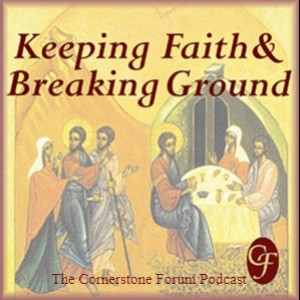Episodes

Tuesday Sep 07, 2021
Tuesday Sep 07, 2021
St. Paul's writings comprise a large part of the New Testament. The Letter to the Romans is considered the most central and comprehensive of all of his writing. He was the most dynamic and peripatetic of all of the first interpreters of the Christian message. Whereas the Gospel writers were careful to relate theological meanings to the detailed events of the life of Jesus and his sayings, Paul took the opposite approach. He extracted the theological meaning of the life, death, and resurrection of Jesus and elaborated it into the foundational understanding of the Christian experience not only of the first century A.D. but for every Christian since then.

Monday Sep 06, 2021
Monday Sep 06, 2021
St. Paul's writings comprise a large part of the New Testament. The Letter to the Romans is considered the most central and comprehensive of all of his writing. He was the most dynamic and peripatetic of all of the first interpreters of the Christian message. Whereas the Gospel writers were careful to relate theological meanings to the detailed events of the life of Jesus and his sayings, Paul took the opposite approach. He extracted the theological meaning of the life, death, and resurrection of Jesus and elaborated it into the foundational understanding of the Christian experience not only of the first century A.D. but for every Christian since then.

Sunday Sep 05, 2021
Sunday Sep 05, 2021
St. Paul's writings comprise a large part of the New Testament. The Letter to the Romans is considered the most central and comprehensive of all of his writing. He was the most dynamic and peripatetic of all of the first interpreters of the Christian message. Whereas the Gospel writers were careful to relate theological meanings to the detailed events of the life of Jesus and his sayings, Paul took the opposite approach. He extracted the theological meaning of the life, death, and resurrection of Jesus and elaborated it into the foundational understanding of the Christian experience not only of the first century A.D. but for every Christian since then.

Saturday Sep 04, 2021
Saturday Sep 04, 2021
St. Paul's writings comprise a large part of the New Testament. The Letter to the Romans is considered the most central and comprehensive of all of his writing. He was the most dynamic and peripatetic of all of the first interpreters of the Christian message. Whereas the Gospel writers were careful to relate theological meanings to the detailed events of the life of Jesus and his sayings, Paul took the opposite approach. He extracted the theological meaning of the life, death, and resurrection of Jesus and elaborated it into the foundational understanding of the Christian experience not only of the first century A.D. but for every Christian since then.

Friday Sep 03, 2021
Friday Sep 03, 2021
St. Paul's writings comprise a large part of the New Testament. The Letter to the Romans is considered the most central and comprehensive of all of his writing. He was the most dynamic and peripatetic of all of the first interpreters of the Christian message. Whereas the Gospel writers were careful to relate theological meanings to the detailed events of the life of Jesus and his sayings, Paul took the opposite approach. He extracted the theological meaning of the life, death, and resurrection of Jesus and elaborated it into the foundational understanding of the Christian experience not only of the first century A.D. but for every Christian since then.

Thursday Sep 02, 2021
Thursday Sep 02, 2021
St. Paul's writings comprise a large part of the New Testament. The Letter to the Romans is considered the most central and comprehensive of all of his writing. He was the most dynamic and peripatetic of all of the first interpreters of the Christian message. Whereas the Gospel writers were careful to relate theological meanings to the detailed events of the life of Jesus and his sayings, Paul took the opposite approach. He extracted the theological meaning of the life, death, and resurrection of Jesus and elaborated it into the foundational understanding of the Christian experience not only of the first century A.D. but for every Christian since then.

Wednesday Sep 01, 2021
Wednesday Sep 01, 2021
At the end of the first century, the scattered Christian communities had no common creed, and anxiety about the waning link with the historical Jesus was inspiring many to grope for bedrock by searching for information about the historical Jesus. In other words, those at the turn of the first century ran the risk of falling into the trap into which many modern biblical scholars have fallen, namely, of hunting for scraps of evidence about the historical Jesus. In response to this dire possibility, the author of John’s Gospel told his community of the cosmic meaning of Jesus’ life. John understood perhaps at a deeper level than the other evangelists — and at a level comparable to that of Paul — the truly radical revolution that the gospels were announcing to the world.

Tuesday Aug 31, 2021
Tuesday Aug 31, 2021
At the end of the first century, the scattered Christian communities had no common creed, and anxiety about the waning link with the historical Jesus was inspiring many to grope for bedrock by searching for information about the historical Jesus. In other words, those at the turn of the first century ran the risk of falling into the trap into which many modern biblical scholars have fallen, namely, of hunting for scraps of evidence about the historical Jesus. In response to this dire possibility, the author of John’s Gospel told his community of the cosmic meaning of Jesus’ life. John understood perhaps at a deeper level than the other evangelists — and at a level comparable to that of Paul — the truly radical revolution that the gospels were announcing to the world.

Monday Aug 30, 2021
Monday Aug 30, 2021
At the end of the first century, the scattered Christian communities had no common creed, and anxiety about the waning link with the historical Jesus was inspiring many to grope for bedrock by searching for information about the historical Jesus. In other words, those at the turn of the first century ran the risk of falling into the trap into which many modern biblical scholars have fallen, namely, of hunting for scraps of evidence about the historical Jesus. In response to this dire possibility, the author of John’s Gospel told his community of the cosmic meaning of Jesus’ life. John understood perhaps at a deeper level than the other evangelists — and at a level comparable to that of Paul — the truly radical revolution that the gospels were announcing to the world.

Sunday Aug 29, 2021
Sunday Aug 29, 2021
At the end of the first century, the scattered Christian communities had no common creed, and anxiety about the waning link with the historical Jesus was inspiring many to grope for bedrock by searching for information about the historical Jesus. In other words, those at the turn of the first century ran the risk of falling into the trap into which many modern biblical scholars have fallen, namely, of hunting for scraps of evidence about the historical Jesus. In response to this dire possibility, the author of John’s Gospel told his community of the cosmic meaning of Jesus’ life. John understood perhaps at a deeper level than the other evangelists — and at a level comparable to that of Paul — the truly radical revolution that the gospels were announcing to the world.

Keeping Faith & Breaking Ground
Without Christianity neither the nature of the present crisis of culture nor the meaning of history itself can be properly comprehended. If the Christian revelation is to come to our aid in this moment of peril, we must learn to account for its sweeping claims in ways that are faithful to Church teachings, intellectually cogent, morally rigorous, charitable, anthropologically sound, and undeterred by the moribund spirit of our age.



